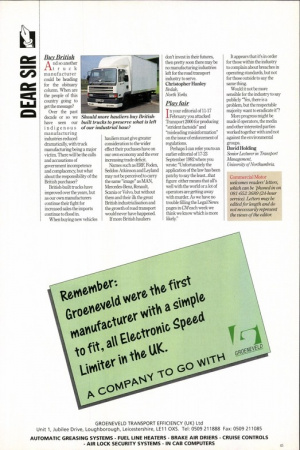Buy British
Page 47

If you've noticed an error in this article please click here to report it so we can fix it.
And so another truck manufacturer could be heading for the obituary column. When are the people of this country going to get the message?
Over the past decade or so we have seen our indigenous manufacturing industries reduced dramatically, with truck manufacturing being a major victim. There will be the calls and accusations of government incompetence and complacency, but what about the responsibility of the British purchaser?
British-built trucks have improved over the years, but as our own manufacturers continue their fight for increased sales the imports continue to flood in.
When buying new vehicles hauliers must give greater consideration to the wider effect their puchases have on our own economy and the ever increasing trade deficit.
Names such as ERF, Foden, Seddon Atkinson and Leyland may not be perceived to carry the same "image" as MAN, Mercedes-Benz, Renault, Scania or Volvo, but without them and their ilk the great British industrialisation and the growth of road transport would never have happened.
If more British hauliers don't invest in their futures, then pretty soon there may be no manufacturing industries left for the road transport industry to serve. Christopher Hanley Bedale, North Yorks Play fair In your editorial of 11-17 February you attacked Transport 2000 for producing "strident factoids" and "misleading misinformation" on the issue of enforcement of regulations.
Perhaps I can refer you to an earlier editorial of 17-23 September 1992 where you wrote: "Unfortunately the application of the law has been patchy to say the least...that figure either means that all's well with the world or a lot of operators are getting away with murder. As we have no trouble filling the Legal News pages in CMeach week we think we know which is more likely" It appears that it's in order for those within the industry to complain about breaches in operating standards, but not for those outside to say the same thing.
Would it not be more sensible for the industry to say publicly "Yes, there is a problem, but the respectable majority want to eradicate it"?
More progress might be made if operators, the media and other interested parties worked together with and not against the environmental groups.
David Holding Senior Lecturer in Transport Management, University of Northumbria.




















































































